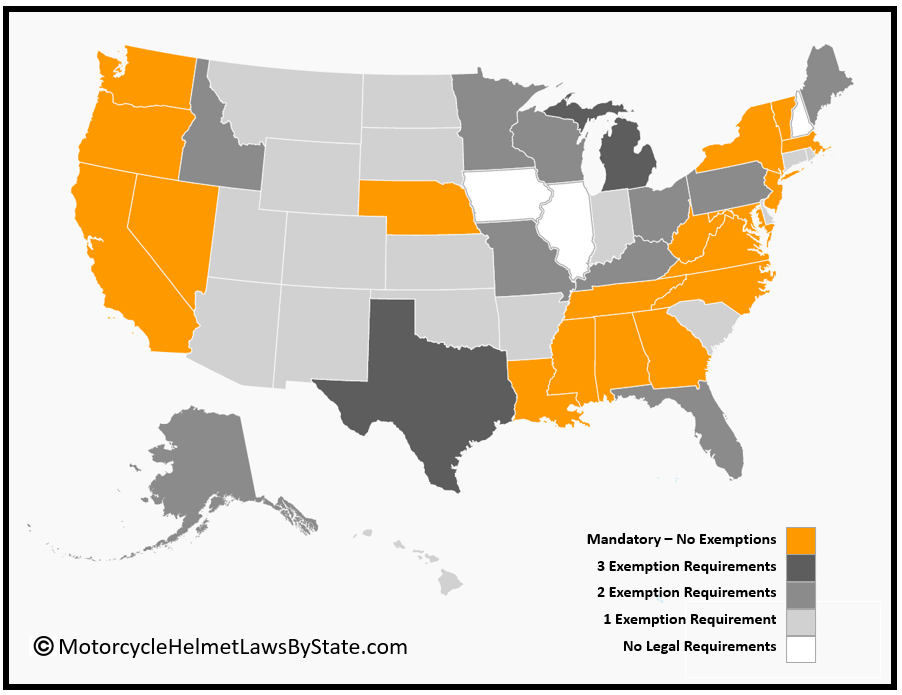Motorcycle Helmet laws by state map
This map of US helmet laws by state shows you which states have laws mandating helmet usage with no exceptions (aka universal helmet usage laws which account for 18 of the 50 states), and which states do not currently have any law regarding motorcycle helmet usage (currently only 3 states), and which states have helmet usage laws but allow for exemptions (the most common category at 29 of the 50 states).
Follow our key below to understand the color coding/shading and you’ll see we define 4 categories that encapsulate US motorcycle helmet laws by states.
The first category (those states shaded in orange) covers all states that require mandatory motorcycle helmet usage and allow for no exemptions.
The second category, represented by various shades of blue, covers those states that have motorcycle helmet usage laws but allow for exemptions. Within this category, there are 3 sub-categories. The sub-categories are:
1) states that have 3 exemption criteria (Michigan and Texas) are in the darkest gray
2) states that have 2 exemption criteria (usually an age and experience requirement) are in the medium gray
3) states that have 1 exemption criteria (usually an age requirement) are in the lightest gray
And finally, the states shaded in white have no motorcycle helmet laws.

Summary of Each State’s
motorcycle helmet laws
Note 1: Unfortunately no US Federal Government information source regularly tracks and updates changes regarding US state motorcycle helmet usage laws (there are some websites that are close).
Additionally, motorcycle helmet usage laws are continually being shifted and adjusted as states continue to adjust their approach to the nuanced issue of government involvement and control in the people’s lives from which the government derives its power.
Therefore the summary below is provided as a free and general guide to US motorcycle helmet laws and we are not responsible for any plans or actions you take as a result of anything you read on this voluntary information guide.
If you need to determine specific requirements for something like motorcycle travel outside of your normal state of travel, you are advised to do your own research and determine for yourself what the applicable motorcycle helmet usage laws are for the state you plan to travel to/through.
If you by chance know of a change to a state’s motorcycle helmet laws and feel your information could help increase the accuracy of this free information source on US motorcycle helmet laws, you are encouraged to contribute that information by contacting us at the provided contact information.
You’ll be doing yourself and other motorcycle riders a service by helping to maintain the best source of information on motorcycle helmet usage laws across the USA!
Note 2: Although most of the US state motorcycle helmet laws fall into one of a few categories, there are a few anomalies (e.g., most require a rider to be at least 18 before the rider can choose to drive without a helmet).
Anomalies are highlighted below in orange text (e.g., some states that allow for helmet-wearing exceptions require that driver/passenger to be at least 21).
The following is a simple alphabetical listing of the State-by-State Motorcycle Helmet Usage Laws:
- Alabama motorcycle helmet laws summary = all riders/passengers are required to use a motorcycle helmet at all times
- Alaska motorcycle helmet laws apply to = anyone under 18 on a motorcycle, anyone operating a motorcycle under a permit
- Arizona motorcycle helmet laws apply to = anyone under 18 on a motorcycle (i.e., both motorcycle drivers and passengers)
- Arkansas motorcycle helmet laws apply to = anyone under 21 on a motorcycle (i.e., both motorcycle drivers and passengers)
- California motorcycle helmet laws apply to = all riders/passengers are required to use a motorcycle helmet at all times
- Colorado motorcycle helmet laws apply to = anyone under 18 on a motorcycle (i.e., both motorcycle drivers and passengers)
- Connecticut motorcycle helmet laws apply to = anyone under 18 on a motorcycle (i.e., both motorcycle drivers and passengers)
- Delaware motorcycle helmet laws apply to = anyone under 19 on a motorcycle (i.e., both motorcycle drivers and passengers)
- Florida motorcycle helmet laws apply to = anyone under 21 on a motorcycle (i.e., both motorcycle drivers and passengers) and must have $10,000 in medical insurance coverage
- Georgia motorcycle helmet laws apply to = all riders/passengers are required to use a motorcycle helmet at all times
- Hawaii motorcycle helmet laws apply to = anyone under 18 on a motorcycle (i.e., both motorcycle drivers and passengers)
- Idaho motorcycle helmet laws apply to = anyone under 18 on a motorcycle (i.e., both motorcycle drivers and passengers) as well as drivers (and their passengers) operating the motorcycle under a permit (vice motorcycle drivers license)
- Illinois motorcycle helmet laws do not exist therefore drivers/passengers are not required to wear a helmet at any time
- Indiana motorcycle helmet laws apply to = anyone under 18 on a motorcycle (i.e., both motorcycle drivers and passengers)
- Iowa motorcycle helmet laws do not exist therefore drivers/passengers are not required to wear a helmet at any time
- Kansas motorcycle helmet laws apply to = anyone under 18 on a motorcycle (i.e., both motorcycle drivers and passengers)
- Kentucky motorcycle helmet laws apply to = anyone under 21 on a motorcycle (i.e., both motorcycle drivers and passengers) as well as drivers (and their passengers) operating the motorcycle under a permit (vice motorcycle drivers license)
- Louisiana motorcycle helmet laws apply to = all riders/passengers are required to use a motorcycle helmet at all times
- Maine motorcycle helmet laws apply to = anyone under 18 on a motorcycle (i.e., both motorcycle drivers and passengers) as well as drivers (and their passengers) operating the motorcycle under a permit (vice motorcycle drivers license)
- Maryland motorcycle helmet laws apply to = all riders/passengers are required to use a motorcycle helmet at all times
- Massachusetts motorcycle helmet laws apply to = all riders/passengers are required to use a motorcycle helmet at all times
- Michigan motorcycle helmet laws apply to = anyone under 21 on a motorcycle (i.e., both motorcycle drivers and passengers) and if the driver has not completed a motorcycle safety course and if the driver does not have $20,000 in medical insurance coverage
- Minnesota motorcycle helmet laws apply to = anyone under 18 on a motorcycle (i.e., both motorcycle drivers and passengers) as well as drivers (and their passengers) operating the motorcycle under a permit (vice motorcycle drivers license)
- Mississippi motorcycle helmet laws apply to = all riders/passengers are required to use a motorcycle helmet at all times
- Missouri motorcycle helmet laws apply to = mandatory for riders under 26 years of age. However, riders/passengers over 26 years of age and having proof of medical insurance are allowed to opt-out of using a motorcycle helmet (* By the way, Missouri is the most recent US state to update their motorcycle helmet laws. The motorcycle helmet law change took effect on 2020.08.28)
- Montana motorcycle helmet laws apply to = anyone under 18 on a motorcycle (i.e., both motorcycle drivers and passengers)
- Nebraska motorcycle helmet laws apply to = all riders/passengers are required to use a motorcycle helmet at all times
- Nevada motorcycle helmet laws apply to = all riders/passengers are required to use a motorcycle helmet at all times
- New Hampshire motorcycle helmet laws do not exist therefore drivers/passengers are not required to wear a helmet at any time
- New Jersey motorcycle helmet laws apply to = all riders/passengers are required to use a motorcycle helmet at all times
- New Mexico motorcycle helmet laws apply to = anyone under 18 on a motorcycle (i.e., both motorcycle drivers and passengers)
- New York motorcycle helmet laws apply to = all riders/passengers are required to use a motorcycle helmet at all times
- North Carolina motorcycle helmet laws apply to = all riders/passengers are required to use a motorcycle helmet at all times
- North Dakota motorcycle helmet laws apply to = anyone under 18 on a motorcycle (i.e., both motorcycle drivers and passengers)
- Ohio motorcycle helmet laws apply to = anyone under 18 on a motorcycle (i.e., both motorcycle drivers and passengers) as well as drivers (and their passengers) operating the motorcycle under a permit (vice motorcycle drivers license)
- Oklahoma motorcycle helmet laws apply to = anyone under 18 on a motorcycle (i.e., both motorcycle drivers and passengers)
- Oregon motorcycle helmet laws apply to = all riders/passengers are required to use a motorcycle helmet at all times
- Pennsylvania motorcycle helmet laws apply to = anyone under 21 on a motorcycle (i.e., both motorcycle drivers and passengers) as well as as well anyone with less than 2-years of driving experience unless that driver has completed a state-approved motorcycle safety course
- Rhode Island motorcycle helmet laws apply to = anyone under 21 on a motorcycle (i.e., both motorcycle drivers and passengers)
- South Carolina motorcycle helmet laws apply to = anyone under 21 on a motorcycle (i.e., both motorcycle drivers and passengers)
- South Dakota motorcycle helmet laws apply to = anyone under 18 on a motorcycle (i.e., both motorcycle drivers and passengers)
- Tennessee motorcycle helmet laws apply to = all riders/passengers are required to use a motorcycle helmet at all times
- Texas motorcycle helmet laws apply to = anyone under 21 on a motorcycle (i.e., both motorcycle drivers and passengers) and if the driver has not completed a state-approved motorcycle safety course and if the driver does not have medical insurance
- Utah motorcycle helmet laws apply to = anyone under 21 on a motorcycle (i.e., both motorcycle drivers and passengers)
- Vermont motorcycle helmet laws apply to = all riders/passengers are required to use a motorcycle helmet at all times
- Virginia motorcycle helmet laws apply to = all riders/passengers are required to use a motorcycle helmet at all times
- Washington motorcycle helmet laws apply to = all riders/passengers are required to use a motorcycle helmet at all times
- West Virginia motorcycle helmet laws apply to = all riders/passengers are required to use a motorcycle helmet at all times
- Wisconsin motorcycle helmet laws apply to = anyone under 18 on a motorcycle (i.e., both motorcycle drivers and passengers) as well as drivers (and their passengers) operating the motorcycle under a permit (vice motorcycle drivers license)
- Wyoming motorcycle helmet laws apply to = anyone under 18 on a motorcycle (i.e., both motorcycle drivers and passengers)

Which States Have Motorcycle Helmet Laws?
Way back in 1966, the US Federal government established the “Universal Motorcycle Helmet Law.” It wasn’t a requirement for states to establish mandatory helmet usage for their residents as much as it established incentives (and penalties) for states to do so (federal funding was set aside for states that participated).
At one point, 47-states complied and had universal helmet usage laws but since that high-water mark of US mandatory motorcycle helmet usage, the number has gradually gone down to 19 states with a universal requirement, about 28 states have laws that allow exemptions, and just 3 states have no helmet laws.
Learn more about the states that do in fact have helmet laws.

Which States Have no Motorcycle Helmet Laws?
Helmet usage laws, among many other governmental issues, are the prerogative of the states and fall within their jurisdiction to establish (or not).
And as such, US states have established motorcycle helmet laws based on the outcome of each state’s political process. There are however currently three US states that bucked the trend and currently do not have any laws/rules when it comes to riders & passengers of motorcycles wearing helmets.
Interestingly, these three states cover different sections of the political spectrum and yet have this one element in common.
Learn more about the the three US states with no motorcycle helmet usage laws.

Which States are contemplating changes to their helmet laws?
Not only have the number of states with mandatory/universal motorcycle helmet usage decreased from its high point of 47 states, but many states have changed their laws to allow for exemptions due to factors such as the age and/or the experience level of the driver.
Another factor that is slowly gaining popularity is a requirement to take a motorcycle safety course. And yet another factor that is starting to appear in laws is the requirement to have medical insurance if a operator/passenger chooses not to wear a helmet.
